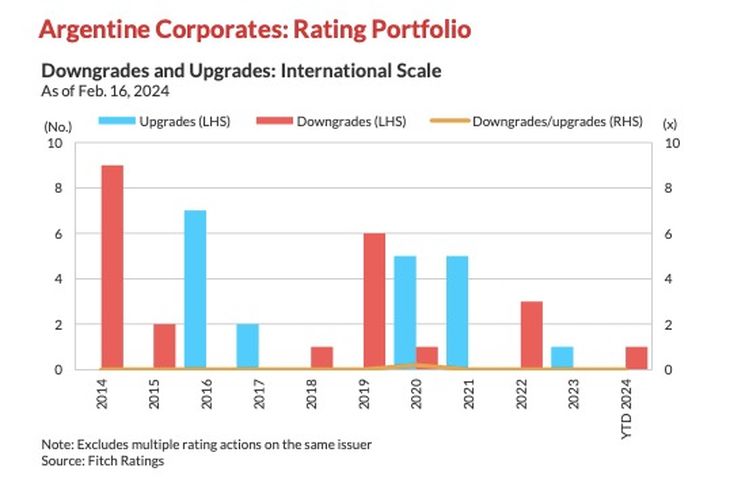Corporate: sector risks
According to the document, the credit situation of the companies analyzed by the risk rating agency is “acceptable” and the greatest threat to these firms is in the segment FX Exposure (Exchange Rate Exposure), as well as the “Macroeconomic Exposure“(Macroeconomic Exposure), which refer to the financial risks that a company faces due to fluctuations in exchange rates between different currencies and macroeconomic conditions, such as inflation, interest rates and economic growth, among other factors.
For Fitch, “Companies are able to weather some turbulence, but liquidity is deteriorating rapidly”, which in the long run means that, if they cannot meet their obligations, they default. In this context, highlights these five risks:
- The correction of deep imbalances macroeconomic changes could be painful and would increase economic, political and social risks.
- The negotiations for refinance sovereign debt could lead to government pressure on businesses to stabilize public finances.
- The elimination of the exchange controls would take time and could harm the payment capacity of issuers.
- He currency risk would be inevitable while the depreciation of the peso consolidates.
- Inflationary pressures may still affect increase companies’ profit margins and erode consumption.
Fitch Ratings’ concerns
The rating agency is concerned “a further devaluation of the peso and inflation”, mainly after the jump in the exchange rate last December. However, the most critical point of the report is the one that maintains that “economic recovery will take time”, while the peso continues to fall, which, added to inflation, continues to be a cause for concern.
On the other hand, it also mentions positive signssuch as recent infrastructure investment in the oil and gas sector to solve transportation problems. For Fitch, these investments could pay off, leading to an increase in energy exports, outpacing imports. “This change could help alleviate some of the fiscal pressure in 2024”, he warns.
That said, the question arises as to whether investors, taking into account what Fitch outlined, are very exposed to The Milei Plan does not go as expected and local companies will soon see their liquidity eroded, weighing down local corporate debt.
Fitch’s report under the scrutiny of analysts
Adrian Yarde Bullerchief strategist of Facimex Securities, maintains in dialogue with Ambit that, naturally, the last few months marked “a more challenging operating environment for Argentine companies”, both due to the jump in inflation that followed the December devaluation “and due to the depth of the recession that we are going through.”
However, the strategist highlights that, at the end of the second quarter of the year, “the situation could improve” if Facimex Valores’ expectation that “activity bottoms in May and inflation is returning to single-digit monthly levels between June and July”.
Thus, Yarde Buller indicates that the two major factors that can boost the recovery will be the compression of the sovereign risk spread and “the lifting of exchange controls”, both key to boosting investment and access of corporate bonds to the capital market. international.
ONs: the strategy to follow
While, Maria Moyano Hidalgoof Adcap Financial Group, does not coincide with the evaluation made by Fitch. This is because he considers that the situation of the companies is becoming “generalized.” Moyano explains that the elimination of exchange controls “They are positive for some companies and detrimental for others.”, depending on the convergence exchange rate and what industry we are talking about.
Moyano does consider that “inflation affects companies in general terms, since their operating costs increase and profitability margins decrease, but, again, it explains that there are some companies with greater exposure to this phenomenon than others.”
WhatsApp Image 2024-03-19 at 05.50.22.jpeg
The strategist states that, facing the second quarter, companies are going to present better results than those of the first and, “Although macroeconomic imbalances can affect them, the companies did a very aggressive job of debt relief and they were very resilient even during the pandemic.”
In that sense, Moyano maintains that the companies that are best positioned to face this year’s challenges are those in the segment Oil & GasFor example, YPF, VISTA, Pan American Energy and Transportadora Gas del Sur.
For its part, Juan Pedro Mazzastrategist Cohenresponds to the query that, from the firm he represents, they are aware of the challenges facing the Argentine economy and companies within this context, “as noted by Fitch Ratings”.
Mazza maintains that Cohen agrees with the vision that “This year represents a crucial period for correcting deep macroeconomic imbalances on the fiscal and trade fronts.”. Although it recognizes that this adjustment process will not be without challenges, especially in terms of impact on the corporate margins and economic activity.
And it is that a more orderly economy, with low inflation and without exchange controls, “could open new opportunities for the corporate sector”.
WhatsApp Image 2024-03-19 at 05.50.09.jpeg

Regarding investment strategy, Cohen is committed to a very selective approach to corporate debt, especially bonds governed by New York law. “Our current recommendation leans towards high credit quality issuessuch as the TGS bonds maturing in 2025, Pampa in 2027 and YPF guaranteed in 2026 and 2031, with internal rates of return (IRR) that we consider attractive given the circumstances: 10% for TGS and Pampa and 9% for YPF” , very much in tune with Adcap’s strategy and the commitment to the Oil & Gas sector.
With respect to Argentine law credits, Cohen’s position “it’s caution” and, consequently, they prefer to avoid them entirely for the moment.
The basis of this decision is that these instruments could face greater difficulties compared to their counterparts governed by New York law“especially in the scenario of an elimination of the exchange rate.”
Taking the above into account, a cautious approach offers investor protection of imminent risks, while maximizing the opportunities that arise in a post-adjustment environment, concludes Mazza.
Source: Ambito
I am a 24-year-old writer and journalist who has been working in the news industry for the past two years. I write primarily about market news, so if you’re looking for insights into what’s going on in the stock market or economic indicators, you’ve come to the right place. I also dabble in writing articles on lifestyle trends and pop culture news.




